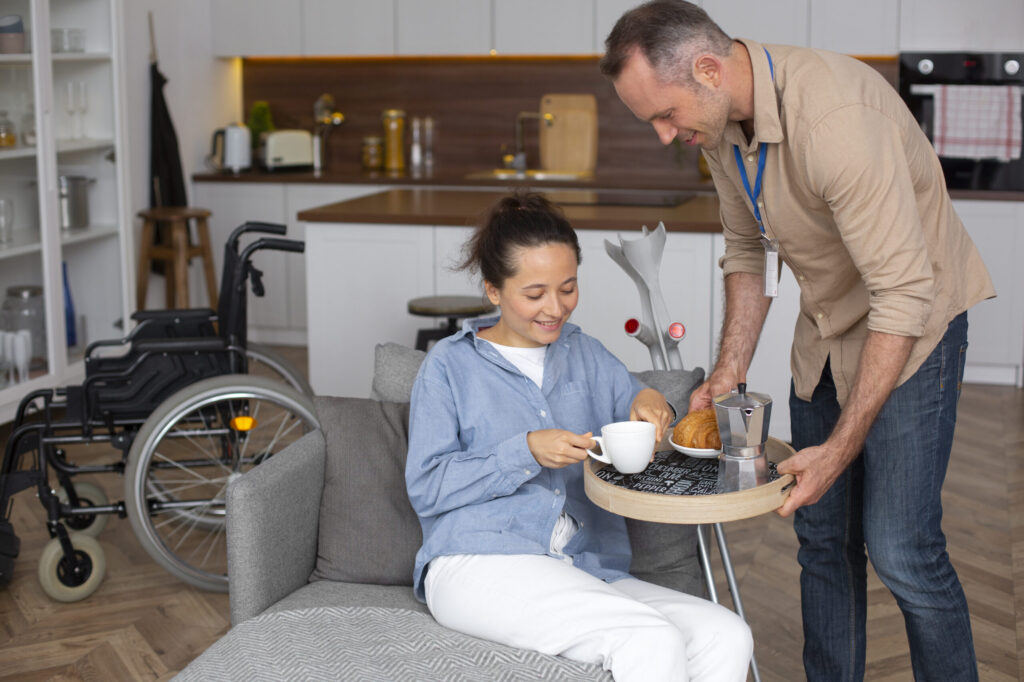Holistic therapy offers NDIS participants a comprehensive and integrated approach to overcoming health challenges, building independence, and enhancing overall well-being. This method goes beyond traditional treatments by addressing the physical, emotional, and social aspects of an individual’s health, empowering them to take control of their lives and achieve greater self-sufficiency

A Comprehensive Approach to Health and Well-being
For NDIS participants, managing a range of health challenges often requires more than just addressing physical symptoms. Holistic therapy provides an all-encompassing approach, integrating various therapeutic modalities to ensure that every aspect of the individual’s health is considered. By combining physical therapy, psychological support, and social services, holistic therapy helps create a balanced treatment plan tailored to each participant’s unique needs.
Occupational Therapy: Enhancing Daily Functioning
Occupational therapy (OT) plays a crucial role in holistic therapy, particularly for individuals with physical or cognitive challenges. OTs work with participants to improve their ability to perform everyday tasks, from personal care to household chores and community engagement. By focusing on functional independence, occupational therapists help NDIS participants enhance their skills and confidence, making it easier for them to manage daily life and achieve their personal goals.
Multidisciplinary Pain Management: Tackling Physical and Emotional Challenges
Chronic pain is a significant barrier to independence for many NDIS participants. Holistic therapy often includes multidisciplinary pain management approaches that combine physical therapy, psychological support, and lifestyle changes. This integrated approach not only addresses the physical aspects of pain but also provides emotional support to help participants manage the mental health challenges that often accompany chronic pain. This holistic view of pain management ensures that individuals can live more comfortably and maintain their independence for longer periods.
The Power of Exercise: Boosting Physical and Mental Health
Exercise is a cornerstone of holistic therapy, offering both physical and psychological benefits. Regular physical activity helps NDIS participants improve their strength, flexibility, and endurance, while also releasing endorphins that promote mental well-being. Whether through structured exercise programs or informal activities, the inclusion of physical fitness in a holistic therapy plan enhances participants’ health and supports their journey towards greater independence.
Counselling and Emotional Support: Strengthening Mental Health
Mental health is a key element of holistic therapy. NDIS participants often face emotional challenges that can affect their ability to manage health conditions or engage in social activities. Through individual counselling, group therapy, or other psychological services, holistic therapy helps participants build resilience, improve emotional regulation, and develop coping strategies. This emotional support is vital in enabling individuals to face challenges with confidence and maintain positive mental health throughout their rehabilitation journey.
A Transformative Path to Greater Independence
Holistic therapy empowers NDIS participants to take charge of their health and well-being, providing them with the tools to lead more independent and fulfilling lives. By addressing all aspects of health—physical, emotional, and social—this integrated approach offers a transformative experience that enhances self-sufficiency and improves quality of life. Through therapies like occupational therapy, pain management, exercise, and counselling, NDIS participants are supported in their journey toward independence, resilience, and overall well-being
Conclusion
Holistic therapy provides NDIS participants with a unique and effective approach to managing their health challenges. By integrating physical, emotional, and social support into one comprehensive plan, holistic therapy empowers individuals to take control of their health and lead more fulfilling lives. Whether through pain management, exercise, or emotional support, this transformative approach enables NDIS participants to move towards greater independence and improved well-being.



